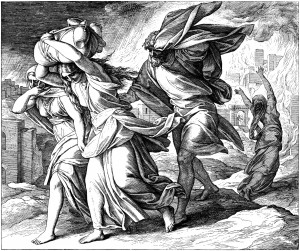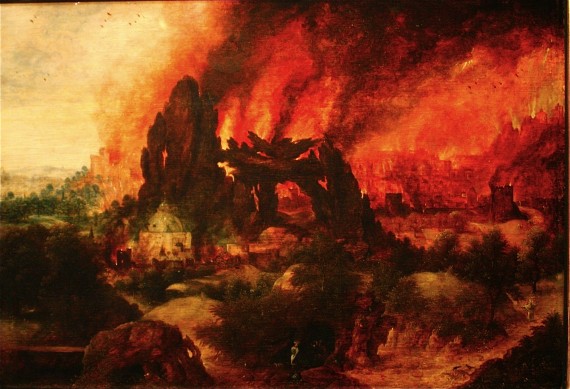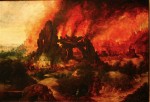The events surrounding the destruction of Sodom and Gomorrah are well known.
The Plan to Destroy Sodom and Gomorrah
In Genesis 18:16-21, God informs Abraham that a great outcry against the cities of Sodom and Gomorrah had come up before Him, and so He was going to destroy the cities if they were as wicked as He had heard.
Abraham, knowing that Lot and his family lived in Sodom, pled with God to not destroy the cities if righteous people could be found within. In one of the most amazing and challenging passages about intercessionary prayer in the Bible, Abraham goes from persuading God to spare the cities if fifty righteous people are found within them, all the way down to only ten righteous people (Genesis 18:23-33).
The Depravity of Sodom and Gomorrah
Genesis 19 shows some of the depths of depravity to which Sodom had sunk.
When the messengers visit Sodom, Lot invites them to stay in his house. Such hospitality was expected at that time. That night, the men of Sodom gather at Lot’s house, demanding that he send the visitors out so they can rape them.
Lot, showing that he himself is not so righteous, offers the mob his two daughters instead, but the crowd will not be dissuaded, and demand that he hand over the two visitors or they will do worse to him (Genesis 19:9).
 The visitors strike the crowd with blindness, and tell Lot to flee the city with his family because “the Lord has sent us to destroy it” (Genesis 19:13). Lot pled with his two sons-in-law, but they would not flee, and ultimately, Lot was forced to flee the city with only his wife and two daughters.
The visitors strike the crowd with blindness, and tell Lot to flee the city with his family because “the Lord has sent us to destroy it” (Genesis 19:13). Lot pled with his two sons-in-law, but they would not flee, and ultimately, Lot was forced to flee the city with only his wife and two daughters.
Behind the Scenes in the Destruction of Sodom and Gomorrah
The entire account pretty clearly seems to lay the direct action of the destruction of the cities in the hands of God. Aside from the statement from the messengers that God had sent them to destroy the cities (Genesis 19:13), the text says multiple times that the Lord sent the destruction, rained down the fire and brimstone, and overthrew the cities in the plain (Genesis 19:14, 17, 21, 24, 25, 29). In light of all this, the case seems pretty cut and dry: God saw the evil; God destroyed the cities.
And yet, just as with Genesis 6–8, there are multiple hints within the text itself and in numerous related passages in the Bible that something else was going on behind the scenes.
The first hint is in the intercessionary prayer of Abraham to spare the city if righteous people lived within it. Though Abraham stopped at ten, one wonder how low God would have gone. Would God have gone to five? To one? What if Abraham had simply said, “My nephew, Lot, lives there. I doubt that even he is righteous, but I love him. Would you spare the city just for him?” Regardless, these are questions with no answers, for they were questions that were not asked.
However, the deeper question from this intercession of Abraham relates to how God would have spared the city if He had found ten righteous people dwelling within.
If, as has been suggested by the Chaos Theory, God cannot always stop destruction when it comes, how is it that God could have stopped this destruction if He had found ten righteous people in the city?
If God has a policy of non-intervention, if nature is out of control, if the destroyer destroys, and if sin cannibalizes itself, how could God have stepped in and stopped all this if He had found ten righteous people in the city?
What seems most likely is that, much like the flood and due to the various elements of the Chaos Theory, God was unable to stop the destruction of Sodom, but would do everything He could to rescue and deliver people from the impending destruction.

Genesis 19 seems to indicate that God knew that there were not ten righteous people in the city.
In fact, as it turned out, there was probably not even one. Neither Lot’s family nor Lot himself turned out to be righteous.
The destruction that was coming upon Sodom and Gomorrah had been coming for a very long time, and God had been holding back this destruction, but the situation has grown so bad that the people had departed from God’s protective hand. Yet God was faithful, loving, and merciful, and did what He could to rescue as many people as possible from the fire and brimstone. When it appeared that not even Lot was going to leave the city, God almost forcibly removed Lot, his wife, and his daughters from the city as an act of pure mercy toward him (Genesis 19:16, 19).
Though Lot and his family probably deserved to be destroyed along with everybody else, God rescued Lot and his daughters through an act of pure mercy toward Lot, and in response to the intercession of Abraham. But note that even though God tried to rescue Lot’s wife, and Lot’s two sons-in-law, they were unwilling to be rescued, and there was nothing God could do to prevent their destruction.
Even Lot himself did not want to obey the commands of God. When instructed to flee to the mountains, Lot argued, and begged instead to be allowed to flee to Zoar (Genesis 19:20). Since this was a city that would not be destroyed, God allowed Lot to go there instead (Genesis 19:21). Once again, we see God’s mercy at work in the midst of widespread destruction.
Yet where in this text do we see Jesus?
If Genesis 19 is to be read in light of Jesus Christ on the cross, we need more evidence that God was taking the blame for the destruction of Sodom and Gomorrah rather than actively sending it.
This is especially true in light of Genesis 19:24-25, 29 which specifically state that the fire and brimstone came from God, and that He “overthrew” and “destroyed” those cities, along with all the inhabitants of the plain. This is a perfect example of what we have been arguing in this book, that God takes the blame for that which He did not prevent, that God bears responsibility for evil things that occur on His watch. Rather than destroying Sodom and Gomorrah, God did what He could to rescue and deliver people from the destruction which they had brought upon themselves.
While this way of reading the text is not blatantly obvious in Genesis 19 itself, several other texts in Scripture provide further evidence that this is the best way of understanding God’s involvement in the destruction of Sodom and Gomorrah.
We will look at these texts tomorrow.
Until then, what are your thoughts so far on this take of Sodom and Gomorrah? Does it seem too much of a stretch? Does it make sense? What objections or additional insights do you have?



